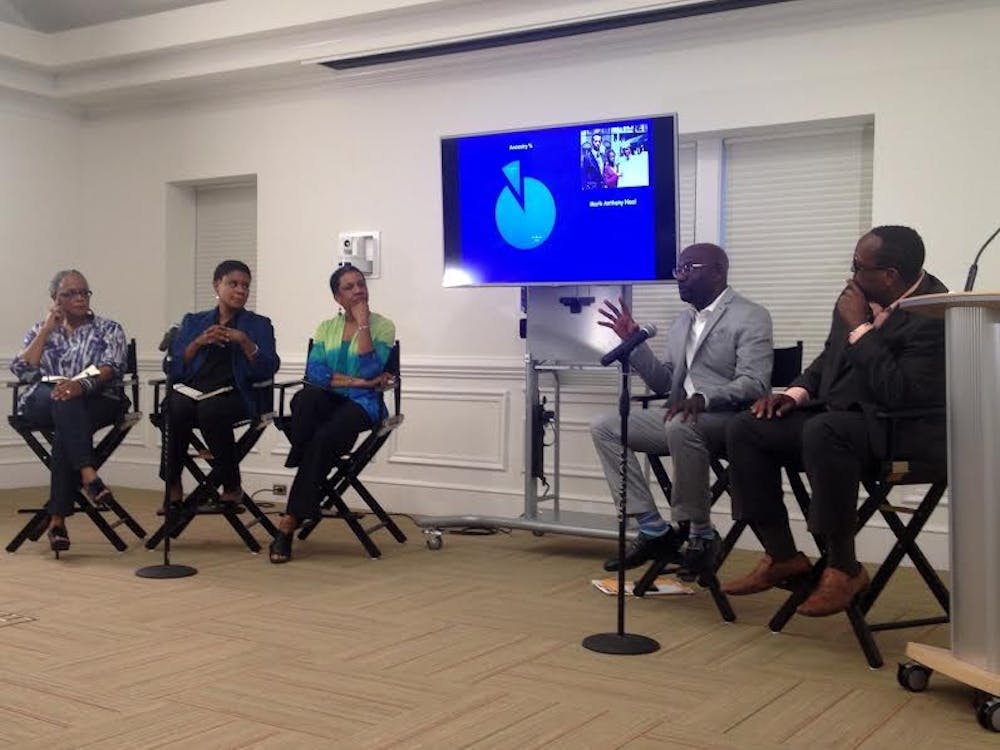In a panel discussion Wednesday night, Duke professor Mark Anthony Neal received the results of genetic testing that showed he has ancestry from both West Africa and Europe.
Neal, professor of African and African American studies, had his DNA tested several months ago by the genetic testing company African Ancestry Inc. The results were revealed to him as he was joined by a panel of scholars in a discussion about the benefits, complexities and limitations of genetic ancestry testing at the John Hope Franklin Center.
The emergence of big data has transformed the use of genetic ancestry testing as a way for people to learn more about their family history, which is important in shaping one's identity, said panelist Rick Kittles, co-founder of African Ancestry Inc. and professor at the University of Arizona College of Medicine.
“For me, it just adds to the complexity of identity, it’s just more information,” Neal said.
Prior to the unveiling, he noted that he had few expectations because he has never viewed his African American identity as lacking.
The testing, which relies on mitochondrial DNA to test maternal ancestry, placed Neal in a lineage group—or haplogroup—that has ancestors who originated in Spain and the Canary Islands. Neal’s Y chromosome testing, which determines ancestry on the father's side, demonstrated his West African origin as it grouped him with Temne people in Sierra Leone.
Neal spoke about his belief of possible Caribbean ancestry on his mother’s side, but he said his European ancestry came as a surprise. He noted that the new knowledge would be something to process, but it would not necessarily change his view of his family.
“For me, family is what you constitute,” Neal said. “I’m the parent of two adopted daughters and biology has nothing to do with that.”
Neal’s result is uncommon among those who do undergo the testing. Kittles emphasized that 97 percent of all African Americans who undergo the maternal testing are placed in a lineage group native to West Africa. Because Africa has the longest existing haplogroups, it is the continent with the most genetic variation.
“One half of all genetic variation found in Africa is exclusive to Africa,” Kittles said.
People often form their own narratives as a way of digesting the test results, said panelist Alondra Nelson, dean of social science at Columbia University.
“I think people weave a very rich tapestry around this to make it make sense,” Nelson said.
There are often strong social and political components to both the reasons for undergoing testing and the interpretations of the results, noted panelist Karla F.C. Holloway, James B. Duke professor of English. How individuals choose to label their own lineage groups determines the narrative of history that they end up with, she said.
Along with questions of personal identity, genetic testing can also answer questions of a more global scale. Holloway spoke about the benefits of using DNA testing as a genetic marker to reconstruct human migration patterns and demographic histories, especially in the context of the Middle Passage.
The conversation left some members of the audience interested in learning more about the technology being used.
“There’s solid research that can lead to other things, but there’s more work to be done,” said Le’andre Blakeney, who works at the Duke Human Rights Center at the Franklin Humanities Institute.
The conversation was moderated by Charmaine Royal, associate professor of African and African American studies and director of Duke’s Center for Genomics, Race, Identity and Difference.
Get The Chronicle straight to your inbox
Signup for our weekly newsletter. Cancel at any time.

